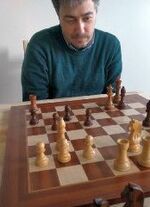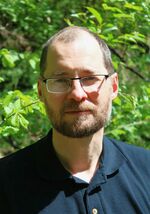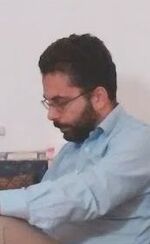About the Authors

Nicola Galesi
Department of Computer, Control and Management Engineering
Sapienza University Rome
nicola[td]galesi[ta]uniroma1[td]it
wwwusers.di.uniroma1.it/~galesi/
Department of Computer, Control and Management Engineering
Sapienza University Rome
nicola[td]galesi[ta]uniroma1[td]it
wwwusers.di.uniroma1.it/~galesi/
Nicola Galesi was born in Bari, the capital of Puglia, a beautiful
region in the south of Italy. He has one daughter, Eva. He holds a Ph.D.
in Computer Science with focus on Complexity Theory, obtained in 2000
under the supervision of Maria Luisa Bonet at the
Universitat Politècnica de Catalunya, in Barcelona. Nicola's
main research interests have always been in proof
complexity, studying the limits of feasible proofs and their relation
with the limits of feasible computations. In 2022 he started a new academic
position focused on mathematics with the Department of Computer, Control
and Management Engineering
“Antonio Ruberti” at Sapienza. Nicola loves reading novels,
listening to all kinds of live music from classical to rock
and practicing tai chi and table tennis.

Leszek A. Kołodziejczyk
Institute of Mathematics
University of Warsaw
lak[ta]mimuw[td]edu[td]pl
https://www.mimuw.edu.pl/~lak/
Institute of Mathematics
University of Warsaw
lak[ta]mimuw[td]edu[td]pl
https://www.mimuw.edu.pl/~lak/
Leszek Kołodziejczyk received his Ph.D. in philosophy in 2005, based
on a thesis in finite model theory, written under the supervision of
Marcin Mostowski. Since then, he has been working at the Institute of
Mathematics of the University of Warsaw, with breaks for postdocs in Prague
and San Diego. He is a mathematical logician with eclectic research
interests that include bounded arithmetic, nonstandard models of arithmetic,
and reverse mathematics. When not working, he enjoys reading, walking in
the woods, and spending time with his family.

Neil Thapen
Institute of Mathematics
Czech Academy of Sciences
thapen[ta]math[td]cas[td]cz
https://users.math.cas.cz/~thapen/
Institute of Mathematics
Czech Academy of Sciences
thapen[ta]math[td]cas[td]cz
https://users.math.cas.cz/~thapen/
Neil Thapen
received his doctorate in 2002 from the University of Oxford, where his
supervisor was Alex Wilkie. He works in mathematical logic, in particular
on bounded arithmetic and related things in proof complexity, and sometimes on
games.
He has been at the Institute of Mathematics in Prague since 2005.
